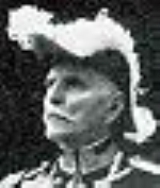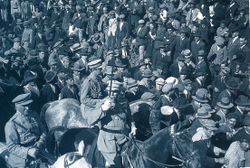
28th May 1926 coup d'état
Encyclopedia

Portuguese First Republic
The Portuguese First Republic spans a complex 16 year period in the history of Portugal, between the end of the period of constitutional monarchy marked by the 5 October 1910 revolution and the 28 May coup d'état of 1926...
and initiated the Ditadura Nacional
Ditadura Nacional
The Ditadura Nacional was the name of the Portuguese regime initiated by the election of President Óscar Carmona in 1928 that lasted until the adoption of the new constitution in 1933, when the régime changed its name to Estado Novo...
(National Dictatorship), later, renamed the Estado Novo, an authoritarian dictatorship that would last until the Carnation Revolution
Carnation Revolution
The Carnation Revolution , also referred to as the 25 de Abril , was a military coup started on 25 April 1974, in Lisbon, Portugal, coupled with an unanticipated and extensive campaign of civil resistance...
in 1974.
The revolution started in Braga
Braga
Braga , a city in the Braga Municipality in northwestern Portugal, is the capital of the Braga District, the oldest archdiocese and the third major city of the country. Braga is the oldest Portuguese city and one of the oldest Christian cities in the World...
, commanded by General Manuel Gomes da Costa, followed immediately in Porto
Porto
Porto , also known as Oporto in English, is the second largest city in Portugal and one of the major urban areas in the Iberian Peninsula. Its administrative limits include a population of 237,559 inhabitants distributed within 15 civil parishes...
, Lisbon
Lisbon
Lisbon is the capital city and largest city of Portugal with a population of 545,245 within its administrative limits on a land area of . The urban area of Lisbon extends beyond the administrative city limits with a population of 3 million on an area of , making it the 9th most populous urban...
, Évora
Évora
Évora is a municipality in Portugal. It has total area of with a population of 55,619 inhabitants. It is the seat of the Évora District and capital of the Alentejo region. The municipality is composed of 19 civil parishes, and is located in Évora District....
, Coimbra
Coimbra
Coimbra is a city in the municipality of Coimbra in Portugal. Although it served as the nation's capital during the High Middle Ages, it is better-known for its university, the University of Coimbra, which is one of the oldest in Europe and the oldest academic institution in the...
and Santarém
Santarém, Portugal
Santarém is a city in the Santarém Municipality in Portugal. The city itself has a population of 28,760 and the entire municipality has 64,124 inhabitants.It is the capital of Santarém District....
. The revolution triumphed when General Gomes da Costa marched on Lisbon
Lisbon
Lisbon is the capital city and largest city of Portugal with a population of 545,245 within its administrative limits on a land area of . The urban area of Lisbon extends beyond the administrative city limits with a population of 3 million on an area of , making it the 9th most populous urban...
along with 15,000 men, being acclaimed by the people of the city.
Timeline of events in 1926
- 27 May, The General Manuel de Oliveira Gomes da Costa arrives at BragaBragaBraga , a city in the Braga Municipality in northwestern Portugal, is the capital of the Braga District, the oldest archdiocese and the third major city of the country. Braga is the oldest Portuguese city and one of the oldest Christian cities in the World...
with the purpose of initiating a Coup d'étatCoup d'étatA coup d'état state, literally: strike/blow of state)—also known as a coup, putsch, and overthrow—is the sudden, extrajudicial deposition of a government, usually by a small group of the existing state establishment—typically the military—to replace the deposed government with another body; either...
. - The Republican Government and Prime Minister António Maria da SilvaAntónio Maria da SilvaAntónio Maria da Silva, GCTE was a Portuguese politician. An engineer, he was a prominent member of the Portuguese Republican Party. He was Prime Minister for four times, during the Portuguese First Republic. After his party victory in the legislative elections of 8 November 1925, he was invited...
, knowing of the forthcoming coup, try to organize resistance believing the uprising can be defeated. - 28 May, A Military coup d'état (henceforth known as the 28th May 1926 coup d'état) begins in BragaBragaBraga , a city in the Braga Municipality in northwestern Portugal, is the capital of the Braga District, the oldest archdiocese and the third major city of the country. Braga is the oldest Portuguese city and one of the oldest Christian cities in the World...
led by Gomes da Costa. Believing to have failed, Gomes da Costa announces his surrender. - 29 May
- The Portuguese Communist PartyPortuguese Communist PartyThe Portuguese Communist Party is a major left-wing political party in Portugal. It is a Marxist-Leninist party, and its organization is based upon democratic centralism. The party also considers itself to be patriotic and internationalist....
interrupts its 2nd Congress due to the political and military situation. - The Confederação Geral do Trabalho (national trade union center) declares its neutrality in the military confrontations.
- The Military Coup spreads to the rest of the country, by influence of Mendes Cabeçadas, Sinel de Cordes and Óscar Carmona, and establishes the Ditadura Nacional (National Dictatorship) against the democratic but unstable 1st Republic.
- The Government of Prime Minister António Maria da SilvaAntónio Maria da SilvaAntónio Maria da Silva, GCTE was a Portuguese politician. An engineer, he was a prominent member of the Portuguese Republican Party. He was Prime Minister for four times, during the Portuguese First Republic. After his party victory in the legislative elections of 8 November 1925, he was invited...
resigns.
- The Portuguese Communist Party
- 30 May
- The General Gomes da Costa is acclaimed in PortoPortoPorto , also known as Oporto in English, is the second largest city in Portugal and one of the major urban areas in the Iberian Peninsula. Its administrative limits include a population of 237,559 inhabitants distributed within 15 civil parishes...
. - The President of the Republic, Bernardino Machado, resigns.
- José Mendes Cabeçadas Júnior becomes Prime Minister and President of the Republic.
- The General Gomes da Costa is acclaimed in Porto
- 3 June, António de Oliveira SalazarAntónio de Oliveira SalazarAntónio de Oliveira Salazar, GColIH, GCTE, GCSE served as the Prime Minister of Portugal from 1932 to 1968. He also served as acting President of the Republic briefly in 1951. He founded and led the Estado Novo , the authoritarian, right-wing government that presided over and controlled Portugal...
becomes Minister of Finance, he resigns 16 days after nomination. - 3 June, The Congress of the Republic of Portugal (National Assembly) is dissolved by dictatorial decree.
- All heads of MunicipalitiesMunicipalities of PortugalIn Portugal, municipality or concelho is the most stable subdivision of Portugal since the foundation of the country.Portugal has an entirely separate system of cities and towns. Cities and towns are located in municipalities, but often do not have the same boundaries, even if built-up is continuous...
are substituted. - The CarbonáriaCarbonáriaThe Carbonária was originally an anti-clerical, revolutionary, conspiratorial society, originally established in Portugal in 1822 but soon disbanded. It was allied with the Italian Carbonari. A new organization of the same name and claiming to be its continuation was founded in 1896 by Artur...
(the Portuguese section of the CarbonariCarbonariThe Carbonari were groups of secret revolutionary societies founded in early 19th-century Italy. The Italian Carbonari may have further influenced other revolutionary groups in Spain, France, Portugal and possibly Russia. Although their goals often had a patriotic and liberal focus, they lacked a...
) is banned. - All Political partiesPolitical partyA political party is a political organization that typically seeks to influence government policy, usually by nominating their own candidates and trying to seat them in political office. Parties participate in electoral campaigns, educational outreach or protest actions...
are banned. - 17 June, General Gomes da Costa provokes a military coup.
- 19 June, General Gomes da Costa becomes Prime Minister.
- 22 June, CensorshipCensorshipthumb|[[Book burning]] following the [[1973 Chilean coup d'état|1973 coup]] that installed the [[Military government of Chile |Pinochet regime]] in Chile...
is instituted. - 29 June, General Gomes da Costa becomes President of the Republic.
- 9 July
- General Gomes da Costa is obliged to step down and goes into exile.
- General António Óscar de Fragoso Carmona, of the conservative military wing, becomes Prime Minister.
- 15 September - Failed military coup.
- 18 September - Failed military coup.
- 29 November - General António Óscar Carmona becomes President of the Republic.
- 16 December, The Police of Information of Lisbon, a Political PoliceSecret policeSecret police are a police agency which operates in secrecy and beyond the law to protect the political power of an individual dictator or an authoritarian political regime....
, is created.

